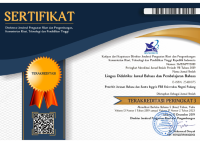Topic Familiarity and Genre Familiarity: Which One Contributes More to Listening Comprehension?
 ), Ainul Addinna(2),
), Ainul Addinna(2), (1) Universitas Negeri Padang, Padang, West Sumatra
(2) Universitas Negeri Padang, Padang, West Sumatra
 Corresponding Author
Corresponding Author
Copyright (c) 2020 Lingua Didaktika: Jurnal Bahasa dan Pembelajaran Bahasa
DOI : https://doi.org/10.24036/ld.v14i2.108328
Full Text:
 Language : en
Language : en
Abstract
The role of prior knowledge has been acknowledged in realm of English Language Teaching, including teaching Listening. Due to the profound role of prior knowledge, experts and practitioners compromise that the first step of teaching listening is building the students’ prior knowledge. However, there is dilemma which background knowledge has the strongest relationship to students’ listening comprehension, either content schemata (Topic Familiarity) or formal schemata (Genre Familiarity). Therefore, this study aimed at investigating the relationship and contribution of topic and genre familiarity to listening comprehension and eventually determining the better predictor of listening comprehension. Furthermore, fourth semester ELT students at Universitas Negeri Malang who were taking advance listening course participated as the subjects in this study. The findings of this study revealed that the contribution of topic familiarity was significantly higher than genre familiarity. This result also pointed out that topic familiarity was better predictor of listening comprehension.
References
Amiri, F., Zainal, Z., & Samad, A.A. (2012). Effects of Text Structure on the Iranian Students’ Reading Comprehension Performance. Procedia- Social and Behavioral Sciences. 66, 402-409.
Asfina, R. (2014). The Effect of English Movie in Pre-teaching of Transactional and Interpersonal Conversations toward Students’ Listening Achievement. Unpublished thesis. Padang: Universitas Negeri Padang.
Bilokcuglo, H. (2014). A Schematic Approach to Teaching Listening Comprehension. EUL Journal of Social Science. 5(1), 76-87.
Buck, G. (2001). Assessing Listening. Cambridge: Cambridge University Press.
Carrel, P.L. (1983). Some Issue in Studying the Role Schemata, or Background Knowledge, in Second Language Comprehension. Paper presented at the 1983 TESOL Convention, Toronto. Canada.
Chang, A.C-S. (2016). Teaching L2 Listening: In and Outside the Classroom. In Renandya, W.A., & Widodo, H.P (eds), English Language Teaching Today, English Language Education. Switzeland: Springer International Publishing.
Chengxing, Li. (2005). Factors Affecting Listening Comprehension and Strategies for Listening Class. CELEA Journal. 28(3). 113-115.
Chiang, C.C., & Dunkel, P. (1992). The Effect of Speech Modification, Prior Knowledge and Listening Proficiency on EFL Lecture Learning. TESOL Quartely. 26 (2), 345- 374.
Cresswell, J. W. (2012). Educational Research (fourth edition). Boston: Pearson
Eidswick, J. (2010).Interest and Prior Knowledge in Second Language Reading Comprehension. JALT Journal, 32 (2), 149-168.
Eliza, S. (2011). The Correlation between Students’ Formal Schemata and Reading Comprehension of Narrative Text at Science Class of Second Year of State Senior High School 3 Pekanbaru. Unpublished undergraduate thesis. State Islamic University Sultan Syarif Kasim Riau.
Elkhafaifi, H. (2005). The Effect of Prelistening Activities on Listening Comprehension in Arabic Learners. Foreign Language Annals, 38(4), 505-513.
Fathollahi, F. & Jahndar, S. (2014). The Effectiveness of the Text Familiarity on Iranian Intermediate EFL Learner’s Novel Lexicl Achievement through Reading Comprehension. International Research Journal of Applied and Basic Sciences. 8 (12), 2176-2184.
Farrokhi, F., and Modarres, V. (2012). The Effects of Two Pre-task Activities on Improvement of Iranian EFL Learners' Listening Comprehension. Theory and Practice in Language Studies, Vol. 2, No. 1, pp. 144-150.
Gilakjani, A.P., & Seyedeh, M.A. (2011). The Effect of Familiarity on Iranian EFL Learners’ Listening Comprehension. Journal of Language Teaching and Research. 2(4), 783-789.
Gilakjani, A,P., & Ahmadi, M.R. (2011). A study of Factors Affecting EFL Learners’ English Listening Comprehension and the Strategies for Improvement. Journal of Language Teaching and Research. 2(5), 977-988.
Goh, C. M. (2008). Metacognitive Instruction for Second Language Listening Development: Theory, Practice and Research Implications. RELC Journal, 39(2),188-213.
Hayati, A.M. (2009). The Impact of Cultural Knowledge on Listening Comprehension. English Language Teaching. 2(3), 144-152.
Hu, X (2012). The Application of Schema Theory in College English Listening Teaching. Theory and Practice in Language Studies, 2(2), 282-288.
Jia, L. (2010). How word recognition is affected by schema activation: An investigation through listening. Chinese Journal of Applied Linguistics, Vol. 33 No. 4, pp. 64-76.
Lin, Z. (2002). Discovering EFL readers’ perception of prior knowledge and its role in reading comprehension. Journal of Research in Reading, 25 (2), 172-190.
Mai, L.H., Luu, T.B.N., & Vo T.T. (2014). Enhancing Listening Performance through Schema Construction Activities. Journal of Language Teaching and Research. 5(5), 1042-1051.
Nunan, D. (2002). Listening in Language Learning. In Richards, J.C., & Renandya, W.A. (Eds). Methodology in Language teaching: An Anthology of Current Practice (pp.238-241). Cambridge: Cambridge University Press.
Oshima, A. & Ann H. (2006). Writing Academic English, Fourth Edition. New York: Pearson Longman.
Ovilia, R. (2019). The Relationship of Topic Familiarity and Listening Comprehension. Advances in Social Science, Education and Humanities Research, 276, 182-186.
Priebe, S.J., Keenan, J.M., & Miller, A.C. (2012). How Prior Knowledge Affects Word Identification and Comprehension. Read Writ. 25, 11-149.
Rahimi, A.H. (2012). On the Role of Strategy Use and Strategy Instruction in Listening Comprehension. Journal of language Teaching and Research. 3(3), 550-559.
Rahmaniah, S. (2015). Genre Familiarity vs Topic Familiarity as Factors Affecting EFL Reading Comprehension across Gender. Unpublished thesis master. Universitas Negeri Malang.
Richard, J.C. (2005). Second Thought on Teaching Listening. Regional Language Centre Journal. 36 (1), 85-92.
Richard, J.C & Renandya. (2002). Methodology in Language teaching: An Anthology of Current Practice. Cambridge: Cambridge University Press.
Rydland, V., Aukrust, V. G., & Fulland, H. (2012). How word, Vocabulary, and Prior Topic Knowledge Predict Reading Comprehension: A study of Language Minority Students in Norwegian Fifth Grade Classroom. Read Writ. 25, 465-482.
Salahshuri, S. (2011). The Role of Background Knowledge in Foreign Language Listening Comprehension. Theory and Practice in Language Studies. 1(10), 1146-1451.
Schmidt & Rinehart, B.C. (1994). The Effect of Topical Familiarity on Second Language Listening Comprehension. The Modern Language Journal. 78, 178-189.
Sharp, A. (2002). Chinese L1 Schoolchildren Reading in English: The Effects of Rhetorical Pattern. Reading in Foreign Language. 14(2), 111-135.
Sulityo, G. H. (2011). Reading for Meaning. Malang: Bintang Sejahtera.
Tudor, I & Tuffs, R. (1991). Formal and Content Schemata in viewing L2 Comprehension. RELC Journal. 22(2), 79-97.
Vandergrift, L., & Baker, S. (2015). Learner Variables in Second Language Listening Comprehension; An exploratory Path Analysis. Language Learning, 65(2), 390- 416.
Qiu, A., and Huang, J. (2012). The Effects of Dynamic Image Schema on ESL Students‘ Systematic Improvement of Listening Comprehension: A Dynamic System Theory Perspective. International Journal of Learning & Development, Vol. 2, No. 1, pp. 241-254.
Zhang, X. (2008). The Effect of Formal Schemata on Reading Comprehension – An Experiment with Chinese EFL Readers. Computational Linguistics and Chinese Language Processing. 13(2), 197-214.
Zohrabi, M., Farhman, F., & Sanaz, R. (2014). The Effect of Topic Familiarity on Iranian EFL Learners’ Listening Comprehension. International Journal of Language Learning and Applied Linguistics World ( IJLLAL). 7(1), 15-33.
 Article Metrics
Article Metrics
 Abstract Views : 583 times
Abstract Views : 583 times
 PDF Downloaded : 167 times
PDF Downloaded : 167 times
Refbacks
- There are currently no refbacks.
Copyright (c) 2020 Lingua Didaktika: Jurnal Bahasa dan Pembelajaran Bahasa

This work is licensed under a Creative Commons Attribution-NonCommercial 4.0 International License.









